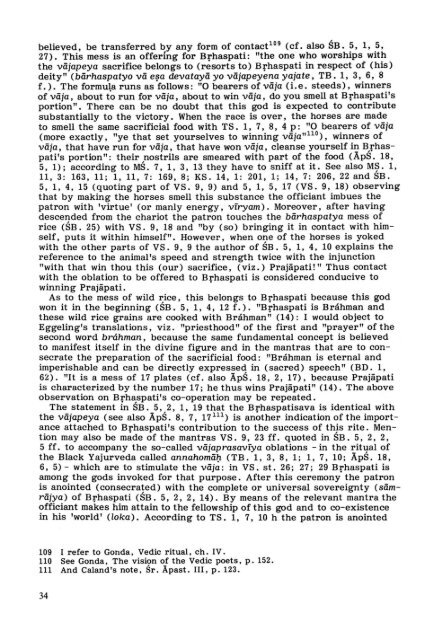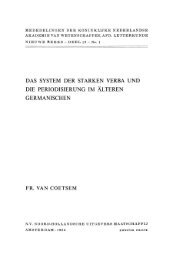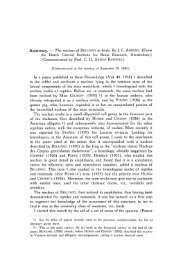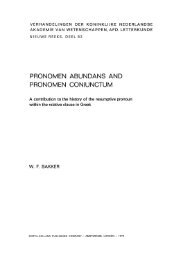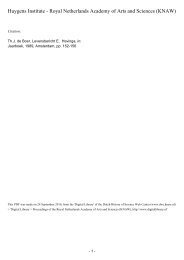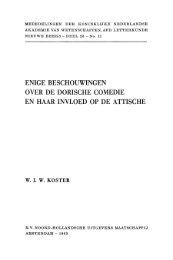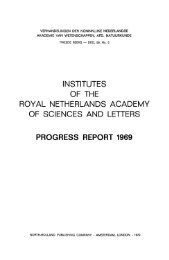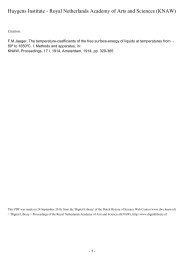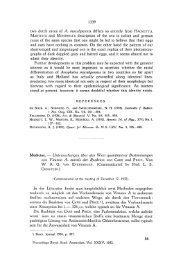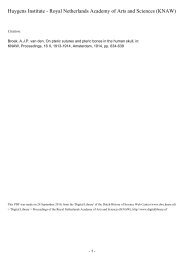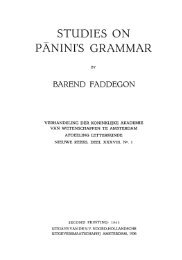Prajapati's relations with Brahman, Brhaspati and Brahma - DWC
Prajapati's relations with Brahman, Brhaspati and Brahma - DWC
Prajapati's relations with Brahman, Brhaspati and Brahma - DWC
You also want an ePaper? Increase the reach of your titles
YUMPU automatically turns print PDFs into web optimized ePapers that Google loves.
elieved, be transferred by any form of contact 109 (cf. also SB. 5, 1, 5,<br />
27). This mess is an offerIng for <strong>Brhaspati</strong>: "the one who worships <strong>with</strong><br />
the viijapeya sacrifice belongs to (resorts to) <strong>Brhaspati</strong> in respect of (his)<br />
deity" (biirhaspatyo vii e~a devatayii yo viijapeyena yajate, TB. 1, 3, 6, 8<br />
f.). The formu\a runs as follows: "0 bearers of viija (i.e. steeds), winners<br />
of viija, abo~t to run for viija, about to win viija, do you smeU at <strong>Brhaspati</strong>'s<br />
portion ". There can be no doubt that this god is expected to contribute<br />
substantiaUy to the victory. When the race is over, the horses are made<br />
to smeU the same sacrificial food <strong>with</strong> TS. 1, 7, 8, 4 p: "0 bearers of viija<br />
(more exactly, "ye that set yourselves to winning viija,,110), winners of<br />
viija, that have run for viija, that have won viija, cleanse yourself in B,rhaspati's<br />
portion": their nostrils are smeared <strong>with</strong> part of the food (ÀpS. 18,<br />
5, 1); according to MS. 7, 1, 3, 13 they have to sniff at it. See also M~. 1,<br />
11,3: 163, 11; 1, 11, 7: 169,8; KS. 14, 1: 201, 1; 14, 7: 206,22 <strong>and</strong> SB.<br />
5, 1,4, 15 (quoting part of VS. 9, 9) <strong>and</strong> 5, 1,5, 17 (VS. 9, 18) observing<br />
that by making the horses smeU this substance the officiant imbues the<br />
patron <strong>with</strong> 'virtue' (or manly energy, vïryam). Moreover , after having<br />
descended from the chariot the patron touches the biirhaspatya mess of<br />
rice (SB. 25) <strong>with</strong> VS. 9, 18 <strong>and</strong> "by (so) bringing it in contact <strong>with</strong> himself,<br />
puts it <strong>with</strong>in himself". However, when one of the horses is yoked<br />
<strong>with</strong> the other parts of VS. 9, 9 the author of SB. 5, 1, 4, 10 explains the<br />
reference to the animal's speed <strong>and</strong> strength twice <strong>with</strong> the injunction<br />
"<strong>with</strong> that win thou this (our) sacrifice, (viz.) Prajäpati!" Thus contact<br />
<strong>with</strong> the oblation to be offered to <strong>Brhaspati</strong> is considered conducive to<br />
winning Prajäpati.<br />
As to the mess of wild r;ice, this belongs to <strong>Brhaspati</strong> because this god<br />
won it in the beginning (SB. 5, 1, 4, 12 f.). "<strong>Brhaspati</strong> is Bráhman <strong>and</strong><br />
these wild rice grains are cooked <strong>with</strong> Bráhman" (14): I would object to<br />
Eggeling's translations , viz. "priesthood" of the first <strong>and</strong> "prayer" of the<br />
second word bráhman, because the same fundamental concept is believed<br />
to manifest itself in the divine figure <strong>and</strong> in the mant ras that are to consecrate<br />
the preparation of the sacrificial food: "Bráhman is eternal <strong>and</strong><br />
imperishable <strong>and</strong> can be directly expressed in (sacred) speech" (BD. 1,<br />
62). "It is a mess of 17 plates (cf. also ÀpS. 18, 2, 17), because Prajäpati<br />
is characterized by the number 17; he thus wins Prajäpati" (14). The above<br />
observation on <strong>Brhaspati</strong>'s co- operation may be repeated.<br />
The statement in SB._5,,2, 1, 19 that the <strong>Brhaspati</strong>sava is identical <strong>with</strong><br />
the viijapeya (see also ApS. 8, 7, 17 111 ) is another indication of the importance<br />
attached to <strong>Brhaspati</strong>'s contribution to the success of th!s rite. Mention<br />
mayalso be made of the mantras VS. 9, 23 ff. quoted in SB. 5, 2, 2,<br />
5 ff. to accompany the so-caUed viijaprasavïya oblations - in the ritual of<br />
the Black Yajurveda caUed annahomii~ (TB. 1, 3, 8, 1; 1, 7, 10; ÀpS. 18,<br />
6, 5) - which are to stimulate the viija: in VS. st. 26; 27; 29 BrhaspaH is<br />
among the gods invoked for that purpose . Af ter this ceremony the patron<br />
is anointed (consecrated) <strong>with</strong> the complete or universal sovereignty (siimriijya)<br />
of <strong>Brhaspati</strong> (SB. 5, 2, 2, 14). By means of the relevant mantra the<br />
officiant makes him attain to the feUowship of this god <strong>and</strong> to co-existence<br />
in his 'world' (loka). According to TS. I, 7,10 h .the patron is anointed<br />
109 I refer to Gonda, Vedie ritual, eh. IV.<br />
110 See Gonda, The vision of the Vedie poets, p. 152.<br />
111 And Cal<strong>and</strong>'s note, Sr. Äpast. 111, p. 123.<br />
34


